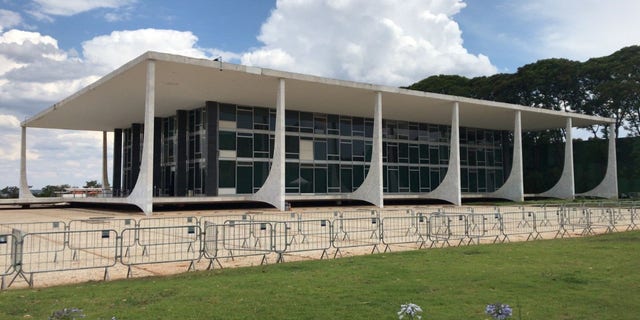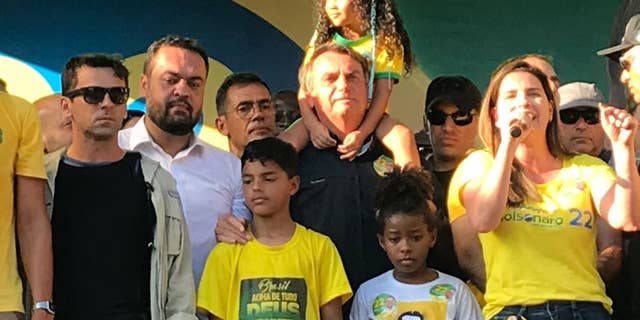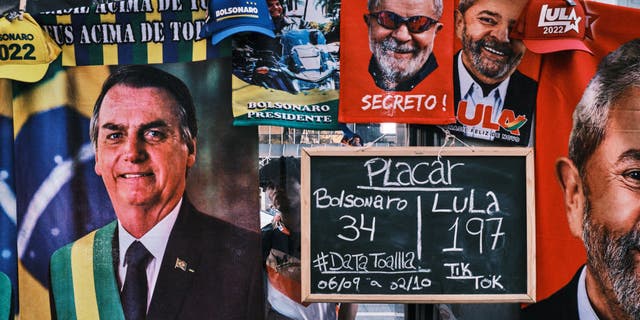Brazil election: Country’s courts accused of taking side of Lula against incumbent Bolsonaro
BRASILIA, BRAZIL – Political observers fear that Brazil’s Supreme Federal Court, the equivalent of the U.S. Supreme Court, and the Supreme Electoral Court, the equivalent of the U.S. Federal Election Commission (known in Brazil as STF and TSE, respectively), have both taken an authoritarian turn as they have repeatedly exercised broad powers to intimidate, censor, fine and even jail critics, in a move seen as an attempted check on the powers of right-wing President Jair Bolsonaro, his supporters and the media.
During Friday’s final presidential debate, on TV Globo, Jair Bolsonaro raised the issue, accusing the Lula camp of using the court to censor critics, and specifically referencing Jovem Pan, the nation’s largest network of radio stations, which has been a frequent target of the court. Jovem Pan is seen as being favorable to Bolsonaro.
Lula made light of the situation asking Bolsonaro about the radio network: “Is Jovem Pan, by any chance, that television channel of yours?”
The Lula camp argues that the Supreme Electoral Court is merely protecting the legal principle of “isonomia” or equal time granted for the other political side to respond.
BRAZIL ELECTION: BOLSONARO, TRAILING BEHIND LULA IN POLLS, SCORES KEY ENDORSEMENT
Yet, Jovem Pan CEO Roberto Araujo told Fox News Digital that the machinations of the court extend far beyond that, while noting that Brazil’s Supreme Electoral Court, known as the TSE, is also involved.
“The TSE decided not only to grant the right of reply to Lula’s campaign, but also to order that the station abstain from dealing – in either news or opinion coverage – with certain facts . . . the comments that were questioned dealt with the conviction of the former president (Lula) and the annulment of legal processes by the judiciary itself. We are, therefore, by the judiciary’s determination, unable to address in our programming, facts that are widely known to the Brazilian people.”
The two powerful courts have also assumed widespread and arbitrary power to censor, and even eliminate, a wide variety of social media posts, campaign materials and opinions. In the American context, it is almost unthinkable that the Supreme Court would get involved in prohibiting individual political statements.
The means by which the STF assumed this power in the first place, appear to be on shaky legal ground. The STF assigned itself the powers in 2019, in a move viewed as a reaction to the perceived undemocratic machinations of Bolsonaro. Dias Toffoli, the court’s chief justice, ordered the policy as a means to silence online critics of his court, specifically citing the events of January 6, 2021, in the United States, as a rationale for taking muscular measures to protect democracy and the interests of the court.
Yet critics belief free speech is under assault.
BRAZIL PRESIDENTIAL ELECTION: JAIR BOLSONARO PROVES POLLS WRONG, FORCES SOCIALIST OPPONENT INTO RUNOFF

Araujo argues, “The decision by the TSE clearly calls into question fundamental principles of our Constitution, such as freedom of expression and freedom of the press. Who defines what is disinformation? The TSE? The STF? This discussion goes far beyond the powers of the judiciary, the legislature and the executive. It is a debate that involves the whole of society and that cannot be used as ammunition to attack political opponents.”
Measures taken include the arrest of five people for posts made on social media that were critical of the STF and other Brazilian institutions.
One court justice, Alexandre de Moraes, reportedly spearheaded the effort, going so far as to order the removal of an article that alleged corruption on the part of Chief Justice Toffoli. He later reversed the decision when the matter in question proved to be factually accurate.
With virtual unanimity, critics say the actions of the Supreme Federal Court have benefited the candidacy of the Workers’ Party’s Lula da Silva, while harming the campaign of the incumbent Jair Bolsonaro. Furthermore, it was only due to a decision on the part of the Supreme Federal Court that Lula was able to run for office.
Despite overwhelming evidence, and a series of convictions for money laundering and corruption, Lula was freed and cleared to run for president for an unprecedented third term. The Bolsonaro camp views an inherent conflict of interest in the decision in that seven of the eleven justices on the Supreme Federal Court were appointed by the Workers’ Party: three by Lula, and four by his predecessor, Dilma Rousseff.
BRAZIL’S ECONOMY MINISTER WARNS WORLD OF STAGFLATION AND ‘VERY ROUGH TIMES AHEAD’

Rio de Janeiro state deputy Marcio Gualberto believes the STF has overstepped its bounds: “the institution of the STF, without a doubt, is very important. It should be concerned with the Constitution, ensuring that the Constitution is enforced . . . it should not be used for political purposes, and much less, for partisan or ideological purposes. This is inconceivable.”
Gualberto cited persistent legal harassment of Jovem Pan: “We now have Jovem Pan censored because of the opinion of its journalists. This mortally wounds a principle that is enshrined worldwide, called ‘freedom of expression.’”
Bolsonaro supporters suggest that Supreme Court justice Alexandre de Moraes is on a misguided and devious mission in his quest to exterminate what he deems to be “misinformation.”
Political analyst Flavio Morgenstern, who himself has been investigated at the behest of de Moraes, argues: “Alexandre de Moraes does not even bother to give reasons. He can. He commands. He censors. He investigates . . . . He can do anything in the country. For he himself judges everything. So we live in fear, as any criticism can make us the next victim, and we will be censored . . . or worse.”
When queried about the court’s actions, Vice President Walter Braga Netto told Fox News Digital, “I’m not going to comment about the STF, but I will say the following. . . . We need to have a system of checks and balances that is provided for in the Constitution. This should work, and when it doesn’t work, this is bad for democracy, and it’s really not working.”

Regardless of Sunday’s outcome, the court’s actions will be questioned and debated for some time in the context of political bias.
Araujo argues, “I believe that there is an excessive judicialization of this entire electoral process. Lula’s campaign resorts to the STF and the TSE all the time, trying to prevent facts from being shown. . . . What is surprising is that democracy is being attacked under the pretext that it has to be defended, and that STF and TSE justices are giving strength to this narrative.”
Read the full article Here


